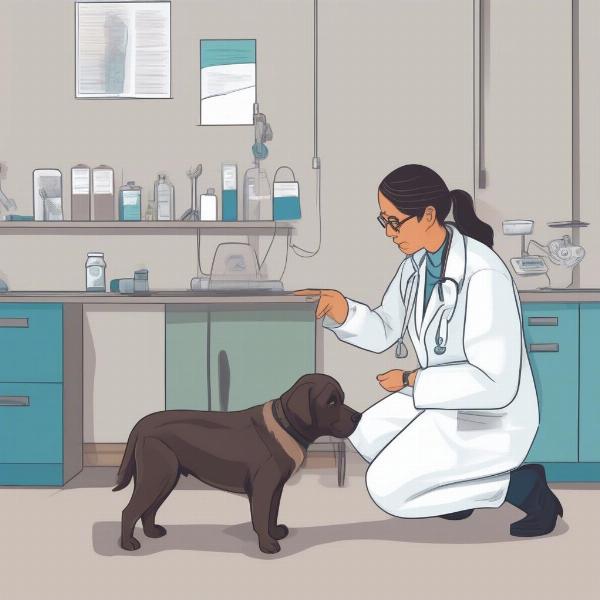Excessive panting in a senior dog can be a concerning sign. While some panting is normal, especially after exercise or in hot weather, frequent or heavy panting in your older canine companion could indicate an underlying health issue. Understanding the potential causes, when to be concerned, and how to care for your senior dog is crucial for their well-being.
Why Is My Senior Dog Panting So Much?
Several factors can contribute to increased panting in older dogs. Some are relatively benign, while others require immediate veterinary attention. Age-related changes often play a role. As dogs get older, their bodies become less efficient at regulating temperature, making them more susceptible to heat stress. Pain, particularly from conditions like arthritis, can also cause panting. Cognitive decline, such as canine cognitive dysfunction (CCD), can lead to anxiety and increased panting. Other potential causes include heart problems, lung disease, Cushing’s disease, and anemia.
When Should I Worry About My Senior Dog’s Panting?
It’s important to differentiate between normal panting and panting that warrants concern. If your senior dog pants excessively even when at rest, in a cool environment, or without any apparent trigger, it’s time to contact your veterinarian. Other warning signs include labored breathing, bluish gums, weakness, collapse, or coughing. If your dog’s panting is accompanied by any of these symptoms, seek immediate veterinary care.
Caring for a Panting Senior Dog
Providing a comfortable and supportive environment for your senior dog is essential, especially if they’re experiencing increased panting. Ensure they have access to fresh, cool water at all times. Avoid strenuous exercise during the hottest parts of the day. Provide a cool, shaded area for them to rest. If your dog has arthritis or other mobility issues, consider providing orthopedic bedding and ramps to ease their discomfort. Regular veterinary checkups are crucial for early detection and management of any underlying health problems.
Medical Conditions That Can Cause Panting
Several medical conditions can contribute to excessive panting in senior dogs. Heart disease, particularly congestive heart failure, can make it difficult for the heart to pump blood efficiently, leading to shortness of breath and panting. Lung diseases, such as pneumonia or bronchitis, can also impair breathing and cause increased panting. Cushing’s disease, a hormonal disorder, can cause a variety of symptoms, including increased panting. Anemia, a decrease in red blood cells, can reduce the blood’s oxygen-carrying capacity, leading to panting and fatigue.
How Can a Vet Help My Panting Senior Dog?
Your veterinarian will conduct a thorough examination and may recommend diagnostic tests, such as blood work, x-rays, or an electrocardiogram (ECG), to determine the underlying cause of your senior dog’s panting. Based on the diagnosis, they will develop a treatment plan tailored to your dog’s specific needs. Treatment may involve medications, lifestyle changes, or other interventions.
 Vet Examining Senior Dog
Vet Examining Senior Dog
Conclusion
Senior dog panting a lot can be a sign of various underlying issues, from simple heat stress to more serious medical conditions. Careful observation, providing a comfortable environment, and seeking timely veterinary care are key to ensuring your senior dog’s well-being. Don’t hesitate to contact your vet if you’re concerned about your dog’s panting, as early diagnosis and treatment can significantly improve their quality of life.
FAQ
- Why is my old dog panting so much at night? Nighttime panting could be due to discomfort, pain, anxiety, or underlying medical issues. Consult your vet.
- Is heavy panting in senior dogs normal? While some panting is normal, excessive panting, especially at rest, warrants veterinary attention.
- What can I do to help my senior dog who is panting a lot? Ensure access to cool water, avoid strenuous exercise in the heat, and provide a comfortable resting area.
- Can pain cause a senior dog to pant? Yes, pain, particularly from conditions like arthritis, can cause increased panting.
- When should I take my panting senior dog to the vet? If the panting is excessive, persistent, or accompanied by other symptoms, seek immediate veterinary care.
- What tests might a vet do for a panting senior dog? Bloodwork, x-rays, ECG, and other tests may be necessary to determine the cause.
- Can anxiety cause panting in senior dogs? Yes, anxiety and cognitive decline can contribute to increased panting.
ILM Dog is a leading international online resource dedicated to providing expert advice on all aspects of dog care and wellbeing. From breed selection and puppy care to senior dog health and training, we offer practical, reliable information to help you provide the best possible care for your canine companion. We offer expert guidance on breed selection, health and medical care, training and behavior, nutrition and feeding, grooming and hygiene, products and accessories. For expert advice tailored to your dog’s needs, contact ILM Dog today. Email: [email protected], Phone: +44 20-3965-8624. ILM Dog is here to support you every step of the way.